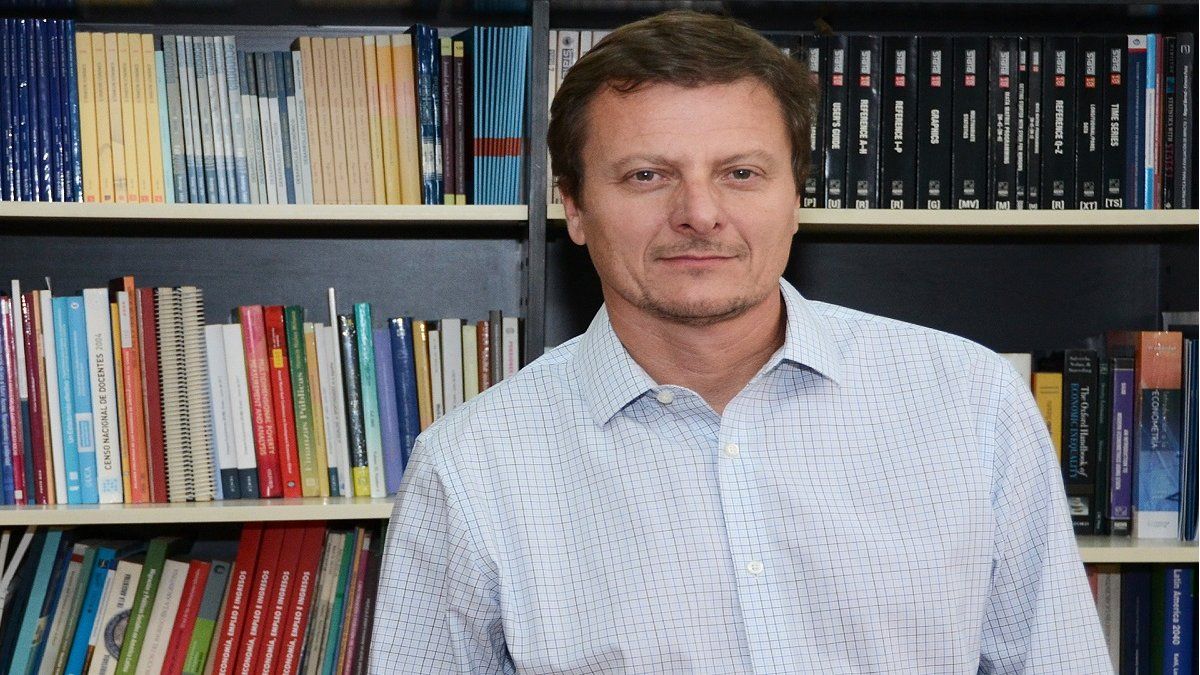Leonard Gasparini: Inequality is definitely a very important social problem. But it is difficult to place it in a ranking, especially in a context where we have so many problems. Despite some recent positive short-term indicators, we continue to have enormous problems with growth, fiscal sustainability, inflation, productivity, international insertion, educational quality and, of course, poverty and indigence. Inequality certainly belongs on this list of important problems.
Q.: How are we today in terms of inequality, if one looks at a series from Argentina from the 21st century to here?
LG: Inequality today is around the level of 2011. After a pronounced fall in the 2000s as a result of the rebound from the 2001 crisis, the very favorable international context and some active policies, inequality stagnated in 2010. Since then it has risen and fallen, but always around a plateau value.
Q.: Does Argentina see a situation similar to that of the region?
LG: As in the rest of Latin America, inequality in Argentina fell in the 2000s, stagnated in the 2010s, increased in the pandemic, and is now returning to pre-pandemic levels. This pattern, broadly speaking, has been similar in all countries, which speaks to the importance of external factors in small economies like ours. The crisis over the invasion of Ukraine is another of these shocks that affect us all.
Q.: What can be expected for this year with the inequality indicator in this post-pandemic context, war in Ukraine and high inflation?
LG: We are at a difficult juncture, with a lot of uncertainty regarding the post-pandemic recovery, the shock of the war in Ukraine, and domestic political volatility, making predictions unwise. My impression is that the reduction in poverty and inequality that occurred in the last semester is going to slow down or stop in this first semester of 2022, especially as a consequence of the acceleration in inflation. What may happen in the second half will depend a lot on whether all these uncertainty factors end up affecting the incipient growth process.
Q.: If these factors affect the growth process, will they inevitably negatively impact inequality?
LG: Not inevitably, but with high probability. Volatility, uncertainty and stagnation are generally closely associated with rising inequality.
Q.: The Minister of Economy, Martín Guzmán, said in Washington that the G20 should find mechanisms to attack the “distributive crisis that the world is suffering”. The IMF proposed the “windfall profit tax”, and Argentina is working on a tax on unexpected income for companies. Could income distribution improve?
LG: Surely taxes of this type have a positive redistributive impact. There are extraordinary profits that could be taxed without this affecting the incentives for investment or production. But, having said that, I think it is very important to take into account some conditions. The first is to identify the winners very well so as not to end up taxing those who did not benefit. The second is to identify the value of the extraordinary rents so as not to transform the initial winners into losers. These are two conditions that are not so easy to meet. Third, I believe that there is no need to commit to permanent expenses with these funds, which are then unsustainable when international prices fall. Finally, it seems essential to me to use part of the funds for investments that increase productivity and long-term growth.
Q.: Within the ruling coalition there is a debate between growth and distribution: grow to distribute, versus distribute to grow. What do you think?
LG: It is a debate that happens everywhere. But between growth and distribution there are often no antinomies. There are measures that help achieve both objectives: improve the education of those most in need, combat evasion, make social spending more efficient, improve access to credit for the vulnerable, these are all measures that reduce inequality, increase mobility and turn promote growth. There the antinomy does not exist. But there are cases where there could be a conflict of objectives. There the solution is not easy because it depends on value judgments. What does seem certain is that extremes must be avoided in this antinomy. There are those who maintain that all inequality is unjustified and that the State has to intervene strongly to eliminate them, and they argue that this intervention does not affect economic incentives. Redistributing without thinking about disincentives to growth is shooting yourself in the foot. All socialist or populist experiences have ended badly for ignoring some basic principles of economic incentives. But at the other extreme, promoting growth without any distributive consideration does not lead to success either. Unregulated capitalism does not have automatic mechanisms to include everyone. And even in the best of cases in which income increases for everyone, if the increase is very unbalanced, it is a source of conflict that will soon threaten the growth process itself.
cover.jpg
Q.: What would be the danger for countries if inequality continues to increase?
LG: High levels of inequality are a problem per se, but also because of its effects on other factors such as economic growth or democratic development. High inequality is dysfunctional to growth. Although it is not easy to provide strong evidence, it is very likely that part of Latin America’s difficulties in terms of growth also have a distributional root. Also, high inequality affects democratic dynamics. In the most developed countries, many have warned that the increase in economic inequality could compromise the very functioning of democracy, since in a context of large wealth gaps, the political system is more easily captured or influenced by the most economically powerful groups. In this context, the basic mechanisms of democracy cease to act normally.
Q.: You said that high inequality is dysfunctional for growth. Why?
LG: One of the main reasons is that inequality implies distortions in the allocation of resources and investment opportunities, whether in physical or human capital. Income or wealth inequality may mean that those who hold certain positions, perform certain tasks, or embark on certain ventures are not the fittest, most skilled, and most efficient, but simply those who had the economic opportunity to do so. And those distortions end up affecting the possibility of growth.
Q.: Where should Argentina start to improve inequality?
LG: Faced with a complex problem such as inequality, there is no place to start, but gradual but permanent actions are necessary on all fronts. One of them is education. If we manage to get a boy from a vulnerable context to access higher education of a certain quality, the probability that he will be poor in the not too distant future will be almost zero and the probability that he will rise in the social ladder will be very high. Without a doubt, education is the great social elevator and public education in Argentina contributes in that sense. Without free public education, the possibilities of social mobility would be much lower than they are today.
Q: “Climbing the social ladder”, as you speak in the book, is it still valid today in Argentina?
LG: Social mobility today in Argentina has too many limitations. The social elevator that is education is not working very well. A young person from a vulnerable home has very different perspectives than one from a high-income home. The first will probably not finish high school, or will do so in a low quality one, with little chance of graduating from university, getting a formal job, or starting a business due to lack of credit. Social ascent is limited to only a lucky few.
Q: To improve education or social investment, public spending is needed. Is there room to increase it?
LG: I don’t think there is much room to increase spending as a percentage of GDP. Of course, if the economy grows, that implies more resources, which can help. I believe that there is much more room in the search for improvements in efficiency and targeting of spending. On the tax side, I see some room to increase progressivity, but especially room to increase collection through a more effective fight against tax evasion and avoidance.
Q: What are the causes of inequality today in Argentina?
LG: There is a temptation to simplify, but unfortunately inequality has multiple causes. It is the product of asymmetries in education, of the imbalance in the ownership of capital and land, of the lack of progressiveness of the tax system, of macroeconomic instability, of the inefficiency of public spending, of tax evasion, of corruption, of external and technological shocks, and of many others. All these causes occur at the same time.
Source: Ambito
David William is a talented author who has made a name for himself in the world of writing. He is a professional author who writes on a wide range of topics, from general interest to opinion news. David is currently working as a writer at 24 hours worlds where he brings his unique perspective and in-depth research to his articles, making them both informative and engaging.




